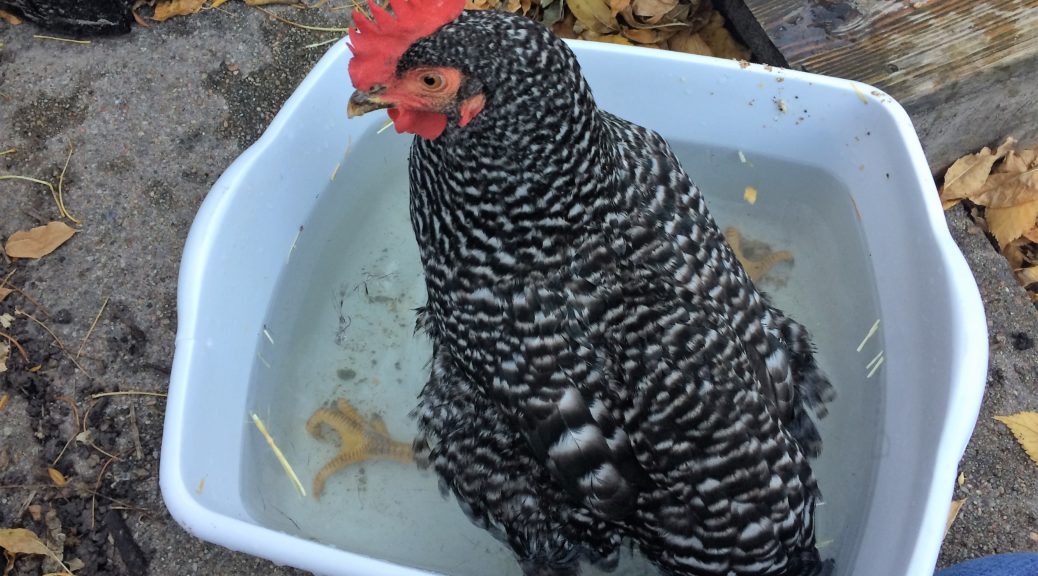
Broody or Egg Bound Hen?
Life with chickens is never dull – there is always some new behavior to entertain you and keep you guessing! Unfortunately that isn’t always a good thing. Yesterday I noticed that my Barred Rock hen, Pepper, was acting unusually. After a while I started to wonder… did I have a broody or egg bound hen on my hands?
Signs of Trouble
Pepper was in the nest box when I checked on the chickens yesterday morning, which isn’t unusual. I left them all in the coop and went to run errands. When I returned several hours later, she was still inside. When I checked on her she was making an odd trilling noise, but otherwise seemed fine. I took the eggs from our other two hens out of the nest and decided to wait another couple hours; sometimes she has a double yolk egg that’s harder to lay. You can hear the sounds she was making in this video:
She was still in the nest by late afternoon, and I was getting worried. My assumption was that she was having trouble passing an egg. If this went on much longer, she could be considered “egg bound”. An egg bound hen is one who gets a fully formed egg stuck inside her vent or along her reproductive tract. This can be painful and even lead to death in a chicken, so it needs to be taken care of quickly. The other option was that she was just feeling broody, and didn’t want to leave her eggs (or what she thought were hers). I decided to treat for both possibilites, just in case.
Symptoms Of A Broody Hen
A broody hen is one who has decided she wants to be a mom. A hen can go broody whether or not her eggs are actually fertilized. She will sit on her eggs (or anyone else’s) around the clock, refusing to leave them. She will only eat and poop once a day, usually when all the other chickens are asleep. This makes for one big, nasty poop, a sure sign of a broody hen! A broody hen is in no physical danger. However, you will likely want to break her of this habit – especially if you don’t have a rooster. If you do have a rooster and want chicks, then by all means let her sit.
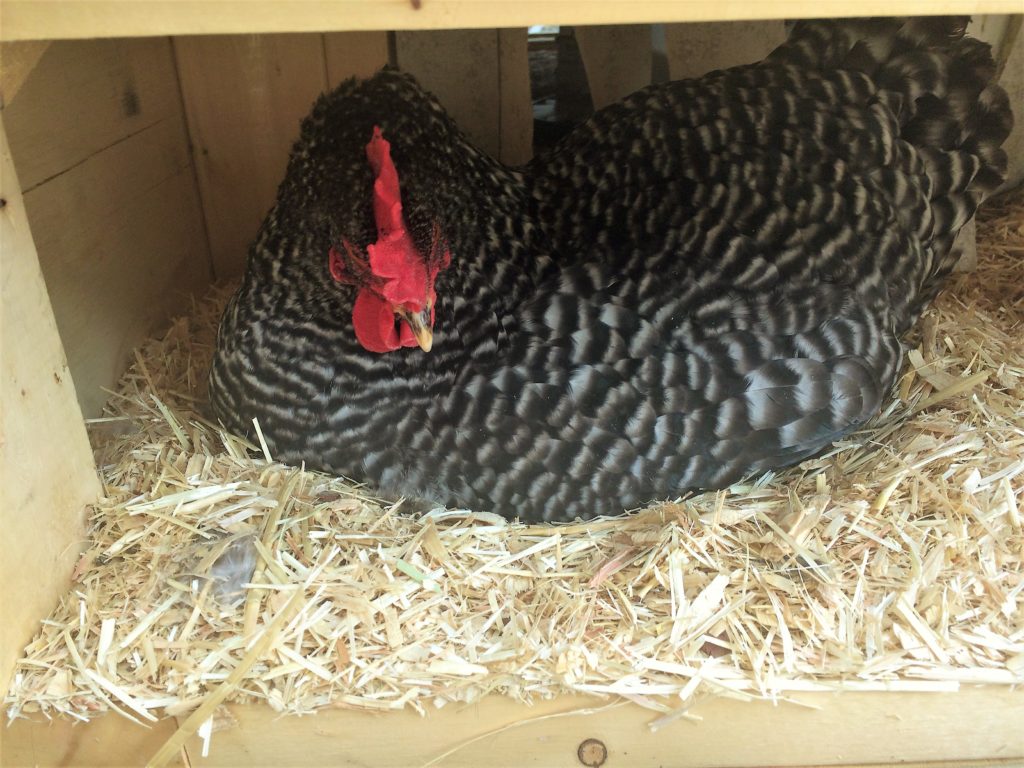
What To Do For A Broody Hen
If you have a broody hen and want to break her of it, the main thing to do is to try to get her away from the nest box. Take her out of the nest and block her access to it. Be careful, she may peck at you! Take away any eggs that she’s trying to sit on, real or fake. In the beginning stages of broodiness, you may be able to bribe a hen out with food, treats, or free ranging. You should also try to “air her out”; get lots of air flow to her bottom and the nest box. This will lower her temperature, which rises in a broody hen. You can even place a bag of frozen veggies in the nest to cool it. Check often to see if any new eggs have been laid, and remove them promptly.
If your hen is especially broody, you may need to isolate her. If she’s aggressive towards you or other hens, has stopped laying eggs, or refuses to come out of the nest box at all, it’s time to bring out the big guns! Put her in a wire cage without any bedding. The air flow will keep her bottom cooled, and without bedding she’ll be unable to nest. Just make sure the holes in the bottom of the cage aren’t big enough for her feet to fall through, so she doesn’t get hurt. A few days of prison life should be enough to scare her straight – for a while, at least. Most broody hens are repeat offenders.
Symptoms Of An Egg Bound Hen
An egg bound hen will typically act ill. If she’s walking around, she’ll probably be waddling like a penguin. An egg bound hen may be lethargic; she may refuse to eat or drink. She might have her feathers fluffed up all around her. If you look at her vent, you will notice that it’s straining, as if she’s trying to push an egg out (she is). An egg bound hen is not able to poop normally. This is because during the laying process the cloaca (end of the intestine) is sealed off to keep the eggs clean. This lack of ability to eliminate is what can kill a hen, either from infection or blockage.
What To Do For An Egg Bound Hen
If your hen is egg bound, you need to try and help her right away. Thankfully this is not usually something that requires veterinary care. An egg bound hen generally only needs two things: an Epsom salt bath, and some extra calcium. Start by getting your bath ready; fill a bucket or tub with 4-6 inches of hot water. You want it very warm, but not hot enough to hurt her. Add 1-2 cups of Epsom salt and stir. The salt water will relax her muscles, and soothe and help lubricate her vent.
Now place your hen in the tub, being sure to submerge her vent. She will likely try to hop out at first, then settle down. The bath seems to be very relaxing and soothing for them. If she has dirty tail feathers, now is a good time to gently clean them off. Speak calmly to her, keeping one hand on her chest or back so she doesn’t try to get away. You can very gently massage her abdomen in the direction of her vent; however, you risk breaking the egg inside her. Egg shells will cut her oviduct, which can cause pain and infection. I chose not to do this. Your goal is to keep her in the warm water for 15-20 minutes. You may need to repeat the bath several times a day until the egg passes.
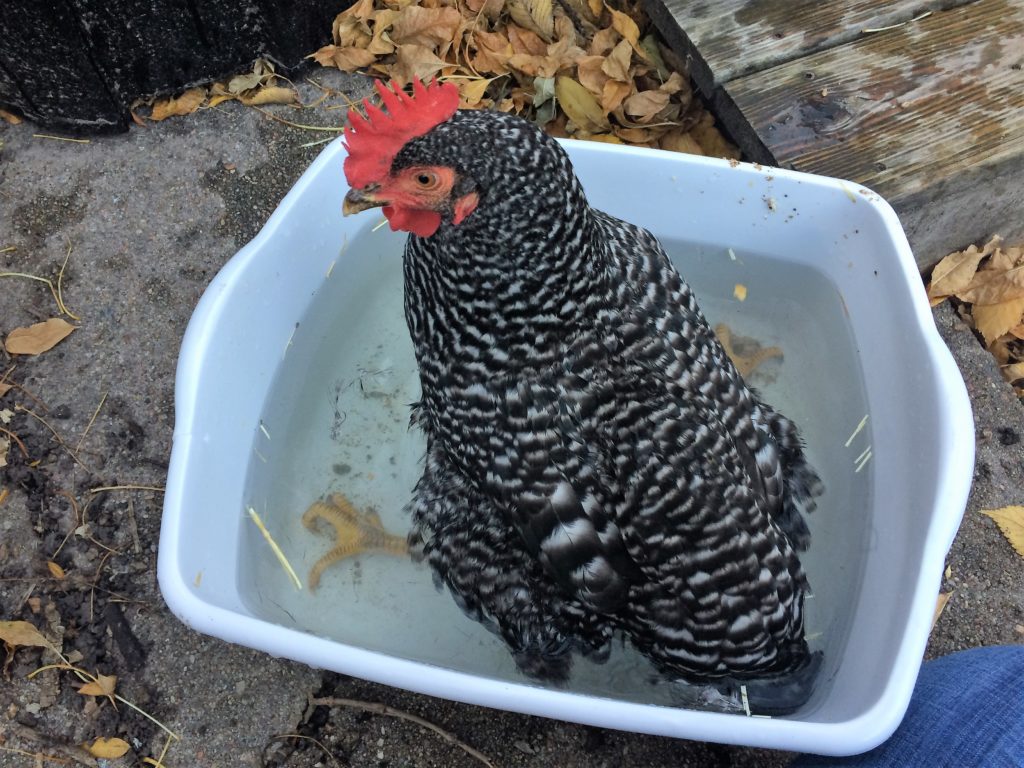
Extra Calcium
Before or during the bath, you should give your hen some extra calcium. Calcium will cause uterine contractions, helping to expel the egg. You can use a couple powdered Tums, calcium supplements, or oyster shell for this. I didn’t have any Tums or supplements, so I ran some oyster shell through a sieve and kept the powder. Mix your calcium powder with a bit of chicken food.
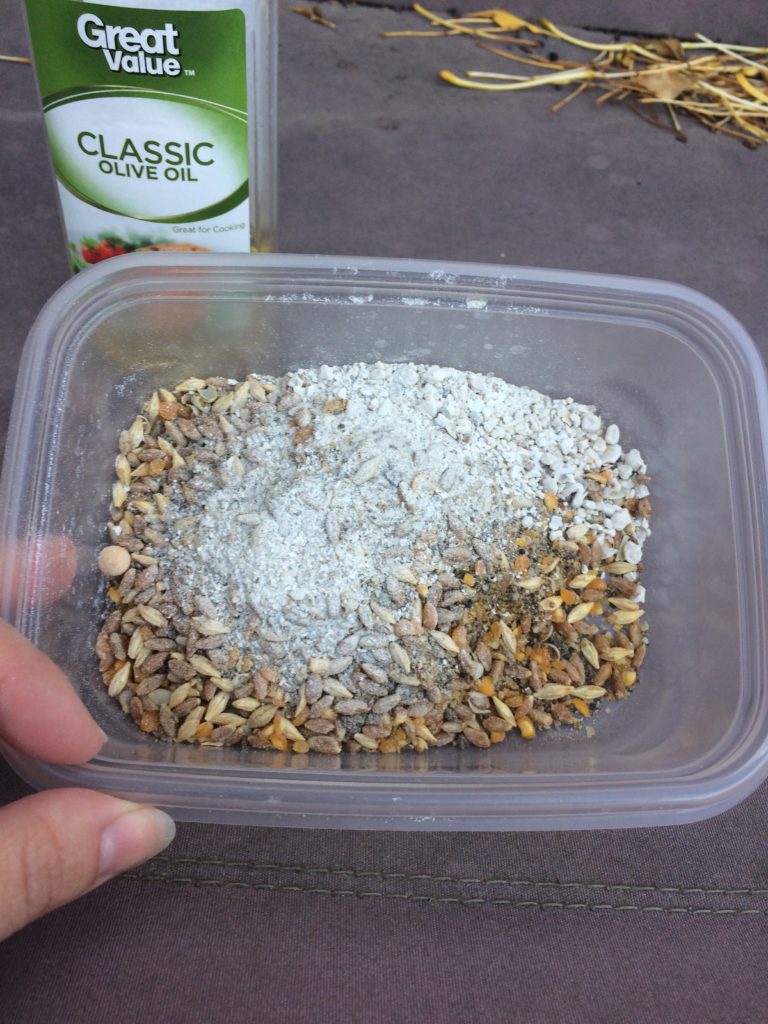
You can also add a little water or olive oil to help the powder stick to the food. Olive oil tastes better to chickens, and may help lubricate the inside of the reproductive tract, so I used that. Offer the food to your chicken and let her eat as much as she wants.
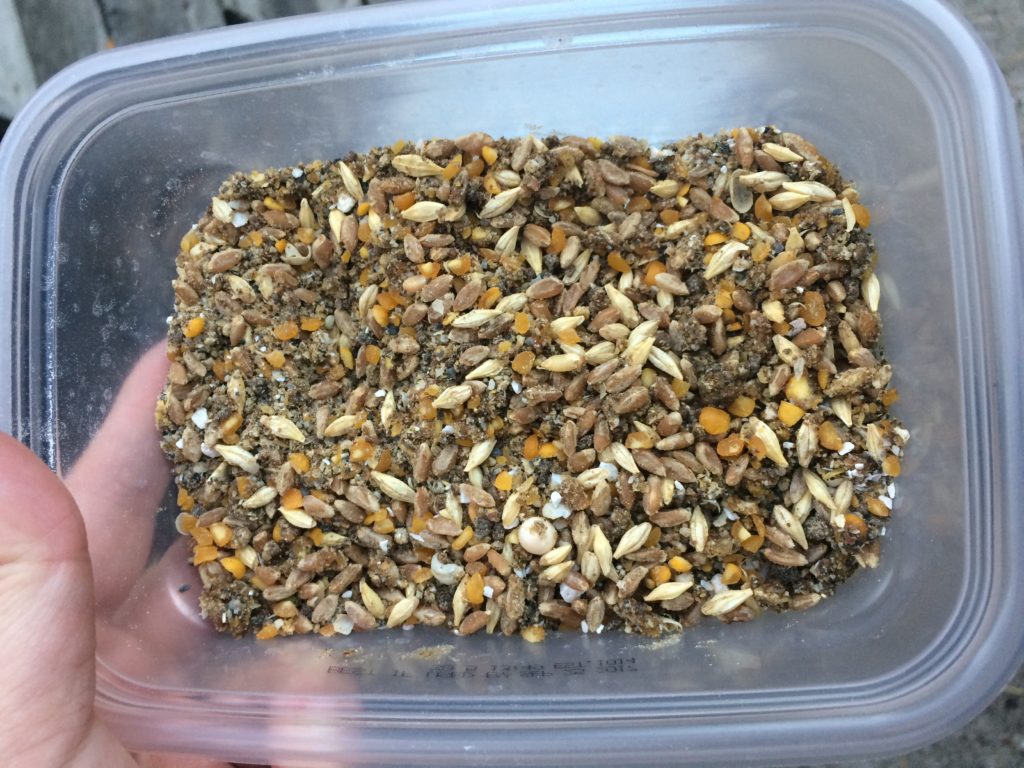

Gypsy Has A Bath, Too
Eventually Pepper got out on her own again, and I let her. She went straight to the coop, had a drink, and got up on the roosting bar for the night. I was relieved that she didn’t get back in the nest box! Gypsy was also a reluctant member of the Dirty Butt Club, so while I had the bath all ready I stuck her in, too. She was NOT happy with me! I had to chase her down and put her back in several times. After I cleaned her I let go, and amazingly she stayed in all on her own. For another 15 minutes I walked around doing chores – filling food and water, scrubbing water dishes, cleaning up. She stayed in the whole time, finally enjoying her spa day!
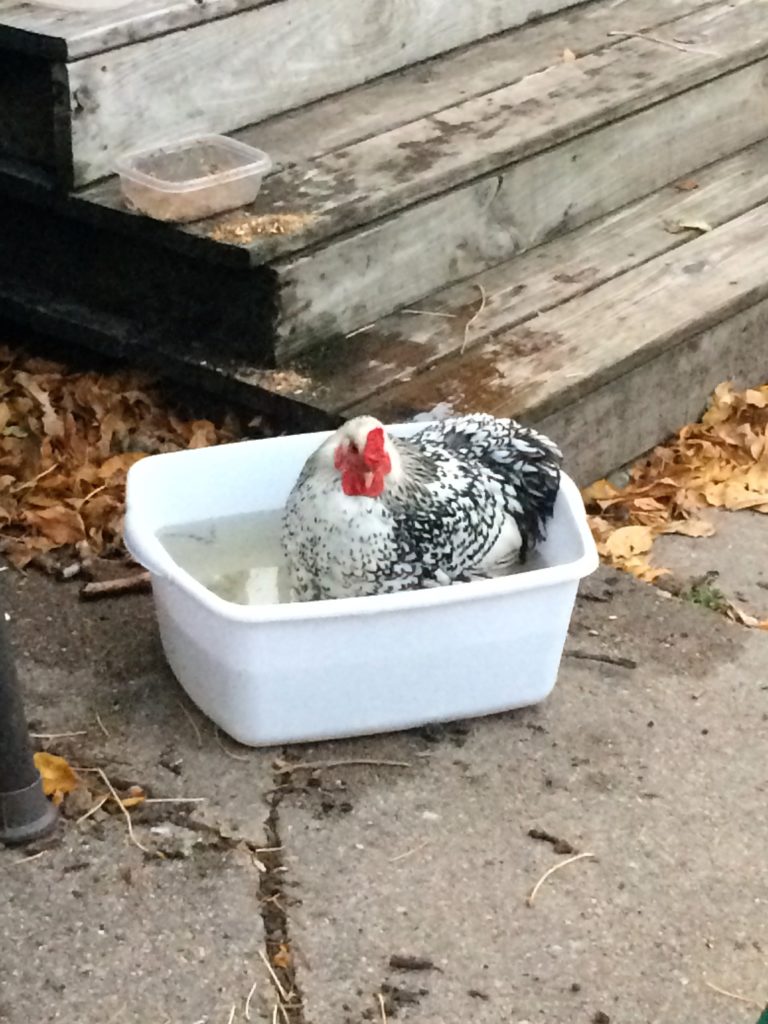
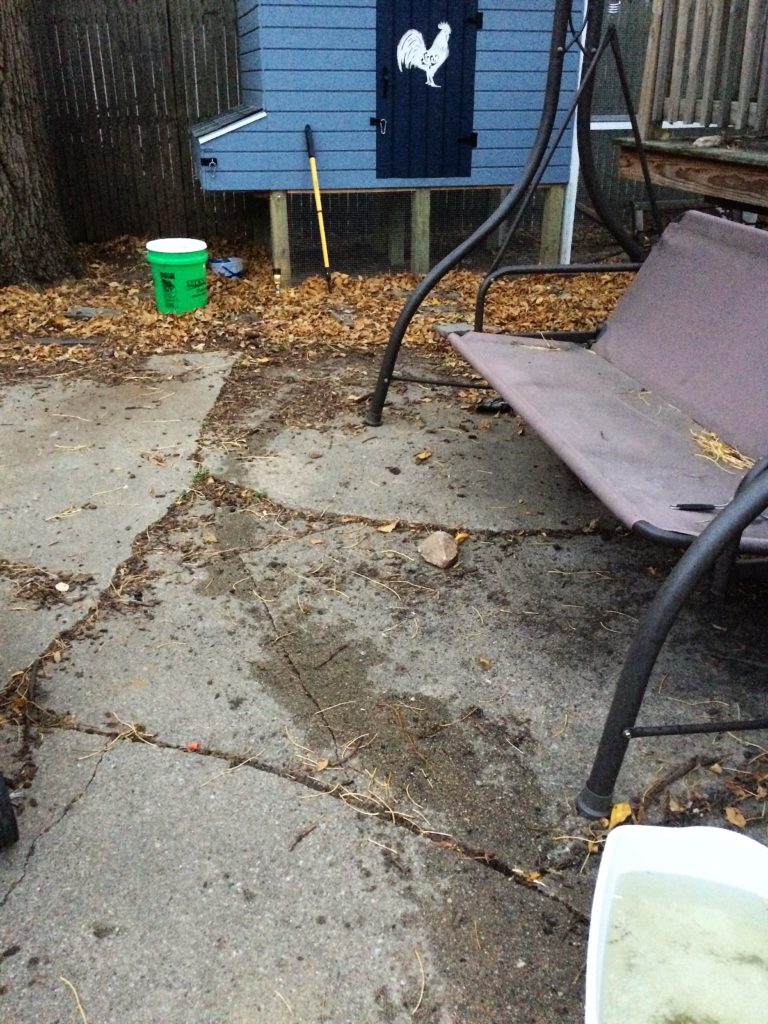
How To Prevent Having A Broody or Egg Bound Hen
To prevent an egg bound hen in the future, always offer your chickens lots of calcium in the form of crushed oyster shell or eggshell. Normally you won’t mix it in with the food; just make it available in a separate bowl. Make sure you’re giving them layer feed, not grower feed. And of course they should always have plenty of fresh water.
There’s not a whole lot you can do to keep a hen from going broody; you can only treat her once she’s already there. Just the same, try to gather your eggs often, so she’s not inclined to sit on them.
Outcome
This morning Pepper was back in the nest box again, which made me nervous. I let the other chickens out and opened the coop door to entice her away. After a short while she came out, too. Now she’s running around scratching and pecking at the ground, just like normal! She doesn’t seem lethargic or sick in any way. She is still making the trilling noise and acting aggressive toward the others though, which is odd.
I did find an egg under her when I moved her to the bath last night. We were out of town the night before, so I’m not sure if it was old or new, but I hadn’t felt it earlier. She hasn’t yet laid an egg today, and I’m watching her closely. All that to say, I’m still just not sure if she was egg bound or if she’s broody! Either way, what I did must have helped. I’m glad she’s back to her old self now!
Update for the Curious:
Pepper was most definitely broody. She stopped laying eggs for a full month. During that time I removed her from the nest box every time I was outside, and bribed her with treats to stay out (by treats I mean vegetables and fruits; lots of scratch and grains are not good for chickens). I now know that the sound she was making in the video above is a typical broody hen noise, kind of a warning to leave her alone. After a month of being broody she went straight into a molt and lost many of her feathers. Chickens don’t lay eggs while they’re molting, so by the time it was all done we went three months without a single egg from her! In February she suddenly starting laying again, and we had an egg from her every single day… until May, when she decided to go broody again. I’m trying to slowly break her of it, but it’s a pain for sure! I may just have to get her a couple fertile eggs to sit on.
~~~

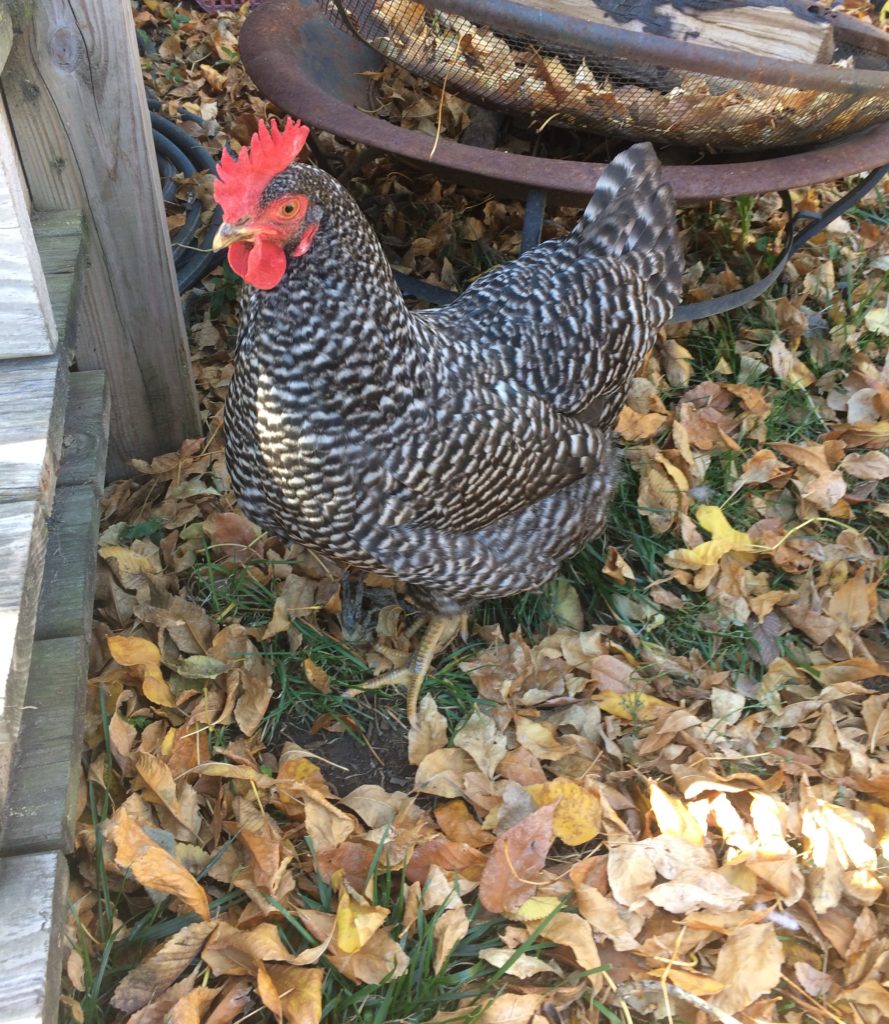
3 thoughts on “Broody or Egg Bound Hen?”
Hello, very much appreciate all the information. It was laid out and listed so professionally. I’m always thankful for people like you who know how to post.
This is so informative! My parents had chickens when I was young but I have never had chickens. So first time for everything! Getting the coop ready and will have 10 laying hens. No rooster! Your information will be stored for good use! Thank you! Poor chickens, hopefully I’ll learn fast! Have talked to lots of experienced chicken people!
I have a chick that does the “Broody” thing – this is the 2nd summer. Got this group of four chix Spring 2020. Added more the next 2 yrs have 13 now. The 2 “Big Birds” that came at same time as the “broody girl” bite her when I make her come outside to eat. And so does the new biggest bird of all. They chase her and bite her hard. Actually most of the bigger birds chase the other 3 smaller birds away from the food. However they keep going from pan to pan and manage to eat some. I usually try to catch these 3 smaller and put them in the lg dog kennel (which houses their smaller houses for laying and roosting) so they can eat in peace – leaving “broody Girl” out and putting her a little bowl kind of hidden so the bigger 1’s can’t keep biting and chasing her away from food. Any suggestions?